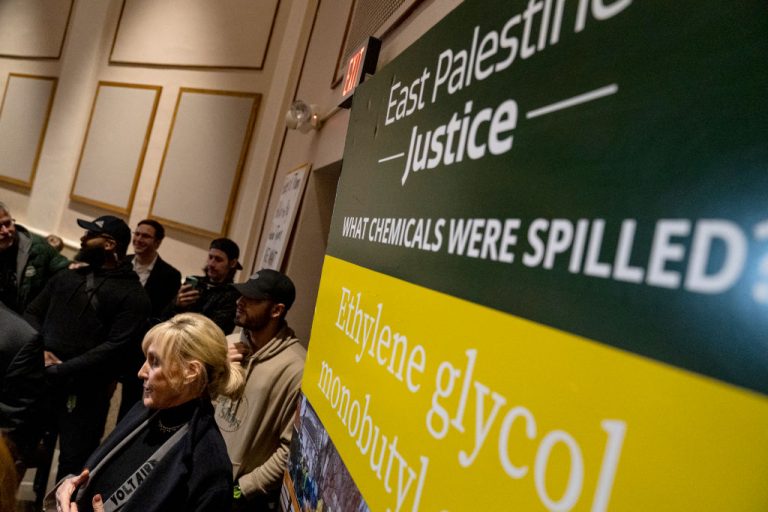Following the toxic train derailment in East Palestine, Ohio on Feb. 3, the Biden administration has come under fire for appearing to be slow to act in the early days of the disaster, while Norfolk Southern, the company responsible for the incident, faces little to no risk for their part in the incident which saw thousands evacuated while the local environment was inundated with toxic “forever” chemicals.
On Feb. 16, nearly two weeks following the derailment, Ohio Gov. Mike DeWine requested federal disaster relief from the Biden administration, a request that was originally denied.
The Biden administration defended their record saying that the Federal Emergency Management Agency (FEMA) wasn’t equipped to support the state’s needs.
“The Biden Administration is mobilizing a robust, multi-agency effort to support the people of East Palestine, Ohio. Since February 3, the Environmental Protection Agency has had personnel on the ground,“ an official for the administration told Fox News.
“But what East Palestine needs is much more expansive than what FEMA can provide. FEMA is on the frontlines when there is a hurricane or tornado. This situation is different,” the official added.
Success
You are now signed up for our newsletter
Success
Check your email to complete sign up
The White House said that four agencies have been involved in supporting East Palestine residents in the aftermath of the disaster including the Environmental Protection Agency (EPA), the Centers for Disease Control and Prevention (CDC), the Department of Transportation (DoT) and the Department of Health and Human Services (HHS).
DeWine’s office said on Feb. 16, that his office was in daily contact with FEMA, but that the agency continued to say that Ohio wasn’t eligible for disaster assistance.
“The state needed help testing the water and air — EPA is providing it. They called for an investigation into the derailment — the Department of Transportation is on it. The Governor today asked for help to conduct additional public health testing and assessments — we’re deploying teams from HHS and the CDC to get that done,” the Biden administration official told Fox News.
“Each federal agency has its own unique role here, and we’ve mobilized an interagency team to get the people of East Palestine the support they need,” the official added.
Authorities continue to say that testing around the site of the disaster indicates that both the air and water are safe for residents.
READ MORE:
- East Palestine Rolled Out Digital ID Wearables Days Before Trainwreck
- Fallout From East Palestine Train Derailment May Have Reached as Far North as Canada
- Donald Trump Pays a Visit to East Palestine, Drops Off Truckloads of Aid
Norfolk Southern apologizes
On Feb. 22, Norfolk Southern’s Chief Executive Officer, Alan Shaw, said that the company will take responsibility for addressing the environmental damage of the train derailment and subsequent “controlled burn” of hazardous materials.
Shaw’s comments came a day after the EPA ordered the rail operator to “pay for cleaning up the mess.”
At a CNN town hall event, Shaw repeatedly apologized to East Palestine residents saying, “We’re going to do what’s right for the community.” However, many residents balked at the comments and are complaining of lingering odors, nausea, rashes and other symptoms they believe are linked to the accident, Reuters reported.
Shaw said the company has already earmarked $7 million as a “down payment” to assist in the town’s recovery and that the company has “sponsored” the removal of 4,600 cubic yards of contaminated soil and 1.7 million gallons of polluted water.
Norfolk Southern’s Chief Financial Officer, Mark George, said the company will quantify the cost of the clean up no later than its first-quarter earnings report, and told an investor conference, hosted by Barclay’s, that a liability policy worth $1.1 billion will help offset the clean up costs.
In a statement issued on Feb. 22, Norfolk Southern said that it intends on excavating soil in the impacted regions and will replace train tracks in the derailment area as part of a remediation plan that will also include soil and surface water sampling.
Scant consequences for Norfolk Southern
While the full extent of the environmental impacts of the disaster remain unknown, Norfolk Southern appears to face little risk.
On Feb. 23, the EPA issued a legally binding order that “will ensure that Norfolk Southern pays for the mess that they’ve created,” according to EPA Administrator Michael Regan.
The EPA announced that Norfolk Southern will be on the hook for $70,000 a day for a failed cleanup effort or approximately $25 million over the span of a year.
While this number looks large at first glance, it represents just a drop in the bucket when considering the company’s revenues.
According to Macrotrends, in 2021, the company posted an annual revenue of $11.142 billion, up 13.82 percent from the year prior; in 2022 the company posted revenues in excess of $12 billion.
That means that if Norfolk Southern fails to fulfill their promises, they could be responsible to pay approximately 0.208 percent of a single year’s revenues in fines for failure to act for an entire year.
However, Regan did say that if the company fails to fulfill their obligations and the government is required to step in to complete the cleanup, Norfolk Southern could be on the hook for three times the total cost of the cleanup in addition to the fines. “That is what the law provides” for, Regan said.
















